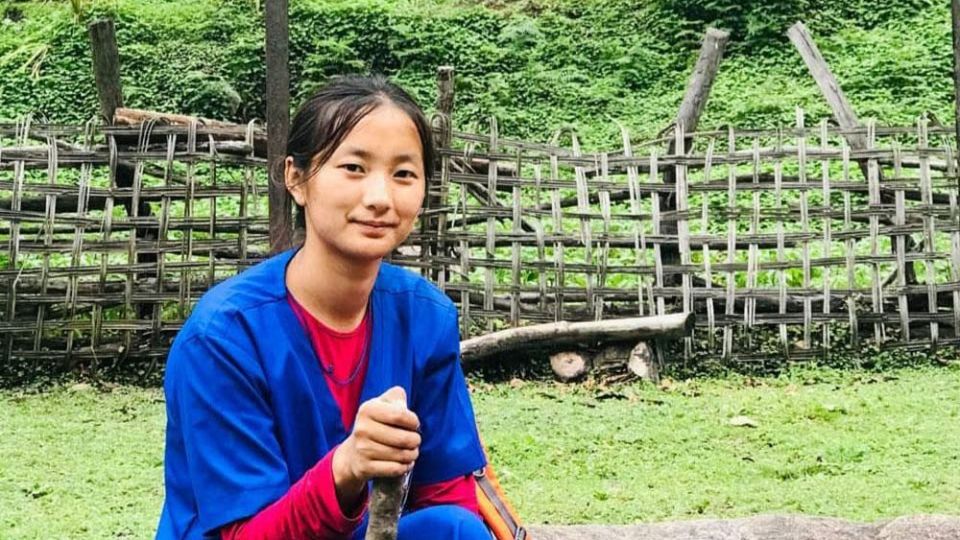November 6, 2025
THIMPHU – It is early morning in the highland village of Soe, Thimphu. Inside a wooden room, the stove glows red, filling the air with gentle warmth. Tshering Wangmo pulls open the window curtains. Outside, the world is white and still. Jichu Drakey Mountain shines under the rising sun, its golden light spilling across the snow.
From the valley below, the sound of yak and horse bells rises through the cold, thin air, a reminder of the quiet life she has chosen.
At 24, Tshering Wangmo has left behind her home in Tongzhang, Trashiyangtse, for the icy heights of Soe. For nearly three years, she has worked here as a Livestock Extension Officer, walking for days from herd to herd, caring for yaks, horses, and the people who depend on them.
After finishing her studies in Animal Science at the College of Natural Resources in Punakha in 2021, Tshering Wangmo accepted her posting to Soe. “Maybe it was written in my fate,” she says with a smile.
Each morning, she wraps her head with a thick hat, ties her boots, and sets off with a box of medicines and vaccines. She is not a trekker by profession, but she walks with purpose. Her destination today is the Jichu Drakey base, one of the hardest herds to reach, with steep slopes, cold rivers, and snow.
By evening, the vaccination work is in full swing. Her hands ache from the cold as she injects medicine, small doses of hope for the animals and their owners.
“Sometimes it’s risky,” she admits. “The yaks are strong, and they can attack.”
When the day’s work ends, the herders invite her into their tents. The warmth of butter tea and their laughter melt away the day’s exhaustion. “That moment, I forget the cold, the distance, and the loneliness.”
Every year, Tshering Wangmo vaccinates over 1,700 yaks and 300 horses. She plans her routes carefully, grouping herders by grazing areas. Many times, she travels alone, using ponies and porters to carry supplies.
“Limited road access and poor communication make the work harder,” she says. “But seeing healthy calves and happy herders gives me strength.”
The challenges are endless. Yaks suffer from internal and external parasites, and young calves fall ill during the long winters. Snow leopards and wolves often attack the herds. Areas like Diding and Khamajatey become cut off during heavy snow. Yet, she continues her rounds, driven by a sense of purpose and calling.
Her work doesn’t stop with animals. Tshering Wangmo also helped start the Soe Lhanor Cooperative and the Product Pulling Centre to improve dairy products and help herders earn better income. The cooperative now has 18 active members who produce butter, cheese, phelu, chugo, and ghee.
“For herders like us, the cooperative changed everything,” says Chimi Dorji, the chairman of Soe Lhanor Cooperative. “Before, we had to walk for days to sell our products. Now, we can sell directly through the cooperative.”
During the 11th Jomolhari Mountain Festival, the cooperative earned over Nu 40,000, a modest but proud moment for the small highland community. The income was used to improve packaging and processing, helping their products reach more people.
Medicines, vaccines, and other essential supplies still have to be brought in from Shana in Paro, the nearest road point, located two days away.
“Porter and pony charges are expensive, so I plan my trips carefully,” Tshering Wangmo says.
Despite the hardships, Tshering Wangmo’s eyes light up when she speaks about her work. “I want to strengthen the cooperative, improve fodder management, and build predator-proof shelters,” she says. “And I want to inspire other young women to work in remote areas. The satisfaction of making a difference is worth everything.”
Better communication tools, solar vaccine carriers, and improved trails would make her work easier, she says.
But for now, she continues, one herd, one mountain, at a time.


